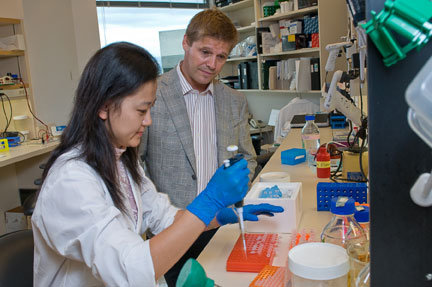Submitted by VCH Research Institute
What forms of prostate cancer require immediate treatment and which don’t?
Prostate cancer is the most commonly diagnosed cancer and the third-leading cause of cancer-related death in Canadian men. Screening has enabled earlier diagnosis of prostate cancer, but with three out of four men actually diagnosed with a non-lethal form, should they all undergo the same treatment?
A group of top scientists and clinicians at leading prostate cancer care and research centres in British Columbia, Ontario, and Quebec is being united through a $4-million Terry Fox Research Institute (TFRI) grant to help answer this question, as part of the TFRI Canadian Prostate Cancer Biomarker Network (CPCBN). The goal is to provide better tools – including new and more effective biomarkers – to treat and manage the disease.
Drs. Martin Gleave and Colin Collins from the Vancouver Prostate Centre at VGH are part of this new pan-Canadian network of prostate cancer researchers. Over the next four years, the group will work to identify new ways to determine what forms of prostate cancer require immediate treatment and which don’t, as well as how to better predict which patients following surgery or radiation treatment are at risk of their cancer progressing.
Of the $4-million in funding, half a million has been provided by the Canadian Partnership Against Cancer. Anticipated impacts of the study could be profound – reducing disease recurrence, improving quality of life for men who have the disease, as well as bringing economic and societal benefits through the more efficient use of health resources.
For more information, click here.

